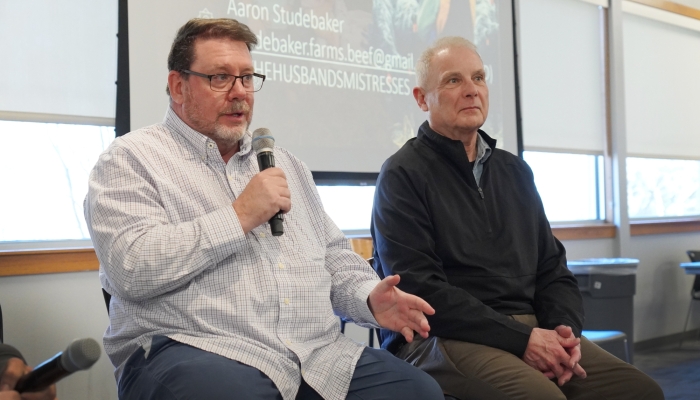Farmer Talk
One of the highlights of the Regenerative Agriculture Conference the NRD hosted in spring 2024 was a chance to hear from Nebraska farmers, discussing their implementation of regenerative practices and the lessons they’ve learned through trial and error on their farms.
 Dennis Fitzke, who farms near Edgar, reported on how cover crops and no-till pay off in a very dry year. “How much rain did you get? I definitely got it all,” he likes to quip. Mycorrhizal fungi can access water for your crop even when there hasn’t been rain, he said.
Dennis Fitzke, who farms near Edgar, reported on how cover crops and no-till pay off in a very dry year. “How much rain did you get? I definitely got it all,” he likes to quip. Mycorrhizal fungi can access water for your crop even when there hasn’t been rain, he said.
Fitzke began no-till in 1994 and continued doing it because it made him more money for less work. He joked that he has found a financially successful model of farming that goes like this: no tillage + low inputs + no insurance + no debt = more profit.
Fitzke noted the advice of soil experts who say a farmer should always carry a shovel and a soil probe, because what they need to know is underground. “There’s no silver bullet for profitability,” said Fitzke. You can’t implement one new practice and assume that’s what will make a difference. Instead, it takes a whole systems approach, because each practice works together, cascading, and compounding forward.
Hank McGowan, who farms in McCool Junction, discussed the challenges of changing family systems. He farms with his father, who was initially resistant to adding conservation practices on their acres. McGowan started planting cover crops to provide an additional source of forage for his cattle and soon discovered that the practice had other benefits, including a reduction of erosion on his roughest land. “If you’re a livestock producer, [cover crops are] a slam dunk,” he said.
McGowan recommended that farmers that want to implement regenerative practices take their worst field and add cover crops there first, as it is where they would have the least to lose and would potentially see improvements fastest.
Aaron Studebaker, who farms near Davey, Nebraska, has been using no-till in some capacity since 2006. He recommends cereal rye as a “bulletproof” cover  crop, especially useful for weed suppression. “We are running out of chemical options for weeds,” he said, which is why planting rye as a cover crop or a second cash crop in a double cropping system can be so valuable. Another advantage Studebaker has seen with cover crops is erosion control on tricky contoured fields. Additionally, the harvested rye reduces his need for other feed for his cattle through the winter.
crop, especially useful for weed suppression. “We are running out of chemical options for weeds,” he said, which is why planting rye as a cover crop or a second cash crop in a double cropping system can be so valuable. Another advantage Studebaker has seen with cover crops is erosion control on tricky contoured fields. Additionally, the harvested rye reduces his need for other feed for his cattle through the winter.
‘We’ve always done it that way’ is a toxic mentality for a farmer, said Studebaker, who recommended making SMART goals: Specific, Measurable, Attainable, Relevant, and Timely. Once the goals are set, hold yourself accountable. How are you improving year over year? “If you can’t measure it, you can’t improve it,” he said.

